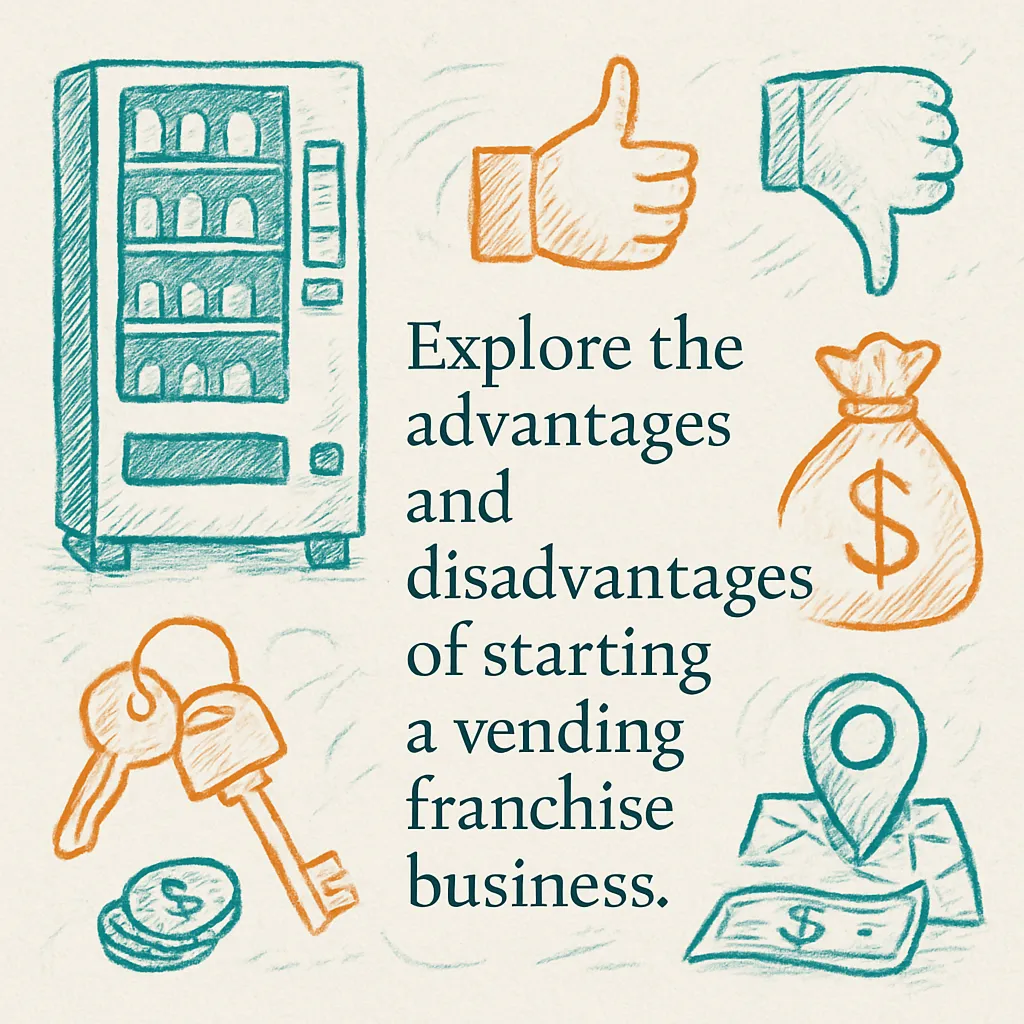Pros and Cons of Vending Franchises
Explore the advantages and disadvantages of starting a vending franchise business before you invest.
Back to Vending Franchises ResourcesExplore the advantages and disadvantages of starting a vending franchise business before you invest.
Back to Vending Franchises ResourcesStart your 30-day free trial and get instant SMS and email alerts whenever a local business needs vending service. These are real location leads to help you grow your route — you decide which ones to buy, no obligations or contracts.
![]() Benefit from a recognized brand and existing operational procedures
Benefit from a recognized brand and existing operational procedures
![]() Understand setup costs, ongoing fees, and revenue sharing models
Understand setup costs, ongoing fees, and revenue sharing models
![]() Evaluate the level of support and autonomy provided by the franchisor
Evaluate the level of support and autonomy provided by the franchisor
30 days free, then $39 / month.
No Commitment. Cancel Anytime.

Venturing into the vending industry can be an exciting prospect for entrepreneurs. For many, a vending franchise offers an attractive pathway, combining the appeal of business ownership with the stability of a pre-established system. However, like any business model, there are distinct advantages and disadvantages to consider before making a significant investment.
One of the most compelling reasons to opt for a vending franchise is the proven business model. You don't have to build a brand or strategy from scratch; you're buying into a system that has already demonstrated success. This includes established operational procedures, recognized branding, and often, a network of preferred suppliers. Franchisors typically provide comprehensive training and ongoing support, which can be invaluable for new business owners looking for a guiding hand. This support can cover everything from machine maintenance to strategies to find vending machine locations, significantly lowering the barrier to entry and reducing the risks associated with starting an independent venture.
Despite the benefits, vending franchises come with their own set of challenges. The initial investment can be substantial, encompassing not just the machines themselves, but also significant franchise fees. Beyond the upfront costs, franchisees are usually subject to ongoing royalty fees and sometimes advertising fund contributions, which can impact overall profitability. A major drawback for some entrepreneurs is the limited independence. Franchise agreements often dictate everything from machine types and product selection to branding and marketing strategies. This strict adherence to corporate guidelines means less freedom to innovate or adapt quickly to local market nuances without franchisor approval. For those seeking complete autonomy, an independent vending business might be a better fit, though it would require more effort in areas like securing permits and insurance.
Vending Exchange connects vending operators with real businesses actively looking for vending services—including traditional machines, AI coolers, and office coffee. Get instant SMS and email alerts when new opportunities are available in your area. No contracts or monthly fees—just buy the leads you want. Start your free 30-day trial today and grow your vending business on your terms.
Key advantages include a proven business model, established brand recognition, franchisor support for training and marketing, and often pre-negotiated supplier relationships.
Disadvantages typically involve high initial investment costs, ongoing franchise fees and royalties, limited independence, and adherence to corporate branding and operational rules.
For new business owners, a vending franchise can offer a less risky entry into entrepreneurship due to the established operational framework and ongoing support, reducing the learning curve.
The cost varies widely depending on the franchise, but it can range from tens of thousands to hundreds of thousands of dollars, including franchise fees, equipment, and initial inventory.
Franchisor support often includes comprehensive training programs, marketing assistance, operational guidelines, technical support for machines, and bulk purchasing power.
Yes, most vending franchises require ongoing royalty fees, typically a percentage of your gross sales, and sometimes an advertising fund contribution.
Many vending franchise agreements include a defined exclusive territory, preventing other franchisees from operating within your designated area, though this can vary.
Profit margins for vending franchises can vary significantly based on location, product selection, operational efficiency, and overall sales volume. It's crucial to review the franchisor's FDD for financial performance representations.
This depends on the franchise agreement. Some franchisors assist with location scouting and approval, while others may allow more franchisee autonomy within their territory, but always within specific brand guidelines.
Common exit strategies include selling the franchise to another qualified buyer, which usually requires franchisor approval, or allowing the franchise agreement to expire, though this isn't always a direct sale.